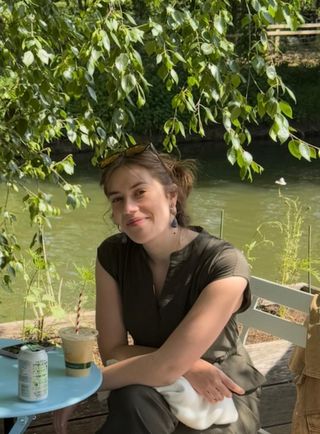
What are you doing at the moment?
What am I doing, I do question it from time to time myself!
I am working for an NGO called International Federation of Pedestrians which advocates the always forgotten right of walking in urban planning. We are an umbrella organisation with more than 50 national walking advocacy groups.
Our NGO has several EU projects where we are partner of, one of them is under my responsibility which is called Just Streets. This project focuses on (re)developing 12 pilot sites in EU shaped by active mobility. The work deals especially with including people who are often left out of urban planning, like children, elderly and people with disabilities. The job allows me to work remotely and travel to these cities to proceed into action!
How did you get there? (What steps did you take / what positions did have after your master‘s until your current occupation?)
I was incredibly lucky to land my current position even before defending my master’s thesis at Bauhaus. One of my EUS classmates (thanks, Jönne!) sent me the job posting, knowing it aligned perfectly with my passion for inclusive mobility and my fight for justice.
During my studies, I kept myself busy (and afloat) by writing for an architecture magazine. Also, I was teaching an introduction to inclusive urban planning during the 2025 Bauhaus4EU Blended Intensive Program in Bergamo.
What current projects do you feel most passionate about?
We have some great projects in the pipeline (tbc ????), I am very excited to hopefully work about urban furniture as it seems so ‘normal’ but can be done in a way to create social cohesion, comfort in walking and fun public spaces. Also, we have plenty of school zones we are helping to develop, doing research on them and bringing all the new knowledge together.
Why did you choose to do your master (Urbanistik / EUS) in Weimar?
Honestly? It was a bit of a last‑minute decision, driven by a graphic novel! I was trying to learn Italian and in doing so I picked up an illustrated book about the Bauhaus school. I had just finished a degree in history and realised along the way that I was more interested in how history shapes cities today than in history itself. The program seemed like the perfect space to dive into that: rooted in critical thinking, open to experimentation, and far from conventional.
What have you learned during your studies that has benefited you now in your working life the most?
Hands-down, it’s how to do field research. My Guided Research Project focused on mobility for people with disabilities in Budapest, and that experience taught me to deeply understand people’s challenges. The theories we explored in seminars also gave me a lens to see cities as complex, interconnected systems. I reflect on them daily, even though my current work zooms in on mobility and street-level interventions.
On top of that, living abroad has taught me a lot. Since moving to Italy in 2022, after completing my previous studies, I’ve had to adapt constantly and figure things out on my own. As a pioneer student (the first in my family to pursue higher education) this experience has meant breaking new ground in many ways. (including many frustrations and tears, but I reflect now also a lot of persistence and courage) Honestly, I still think I could write a book about living out of two suitcases while studying over three years abroad. ????
Do you have any further tips and remarks for current (international) students joining the job market?
In general, finding a first job, that fits your requirements, hopes and aspirations is just hard. It takes a lot of courage putting yourself out there. I’m not a fan of the word “networking,” but the truth is, it helped me a lot to figure out what I wanted to do (and what I certainly did not want to do). For me, networking was never about collecting LinkedIn contacts; it was about building good connections with people who share the same passion for inclusive cities.
You are not alone in your search, and we (EUS alumni and students) are there to help. You can always reach out!
Which advice would you give your younger student-self if you could?
Be even more reckless, maybe I can still do that?
I learned from my Bauhaus peers is that everything is possible, makeable, and changeable. They are so vocal, hands-on, and driven that I wish I had put myself out there more during my time in Weimar. And also: take your time. That’s a privileged thing to say, I know as time is money, and not everyone can afford to slow down. But if you can find ways to support yourself, give yourself the time to learn and explore themes, not drill knowledge. I feel like Bauhaus students are very good at this!
